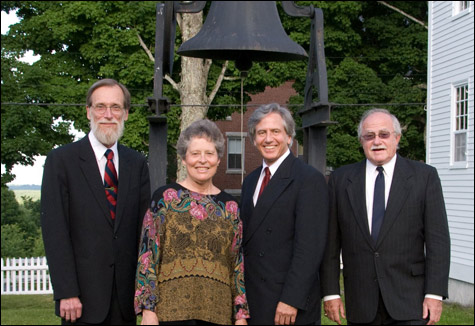
FOUR DECADES ON The Portland String Quartet. |
To celebrate the group's 40th anniversary, the Portland String Quartet will have a good time playing some favorites, but also will push themselves with some of the most difficult works they perform. They'll have help from renowned pianist Laura Kargul, who will join in for one of the three program selections.
"As we get older it's very important we keep challenging ourselves," says PSQ violist Julia Adams. "If a piece is difficult, it's our job to make it sound easy."
The quartet began in 1969 and has continued to make a name for itself by performing and recording little-known or commissioned works by modern composers, as well as thoroughly covering the standard repertoire. And 40 years on, they're still at it, with all four original musicians.
The Sunday afternoon concert will begin with Mozart's String Quartet in G major, K.387. While this may seem a less than inspired selection, the work was chosen quite intentionally.
"This is one of our all-time favorite pieces," says Adams. "It connects the Baroque and Classical periods. It's so historically important."
Mozart wrote the piece as the first in a selection of six quartets written without being paid a commission, all of which he dedicated to fellow composer Franz Joseph Haydn. In the dedication, Mozart refers to the works as his "six children" and asks Haydn to accept them despite the flaws the more experienced composer might see in them. These six are said to be some of Mozart's most melodic and sophisticated works.
The PSQ's choice to follow Mozart with a piece by modern composer Walter Piston (String Quartet No. 1, from 1933) comes as no surprise. The PSQ has been performing and recording Piston's works for years, including his final work, a concerto for string quartet with winds and percussion, commissioned by the PSQ and premiered by the quartet and the Portland Symphony Orchestra in 1976. The quartet has recorded all of Piston's works for string quartet as well as a number of his quintets.
"Piston did not follow the avant-garde movement of the time," explains Adams. "(He wrote) complex rhythms, but they always resolved tonally."
What is most interesting about Piston is how greatly the French Neoclassicists with whom he studied influenced his style, and how blatantly he refused to adopt the atonal tendencies that consumed American classical music in the mid-20th century.
But certainly the gem of the program will be the moment when Kargul joins the quartet on stage for a performance of French composer Cûsar Franck's Piano Quintet in F minor.
"This is 19th-century romanticism at its finest," says Kargul. "It's so strong formally that it doesn't fall apart. But it's passionate. He was breaking new ground with this."
Both Adams and Kargul agree that the piece is challenging, both technically and emotionally.
"There's not a note to be played without some kind of feeling," says Adams.
Kargul chose the Franck for several reasons, one of which was the challenge of learning a piece she has never performed before. With its quick harmonic changes, large chords, and rhythmic complexity, putting together such a work with four other players will certainly not be easy.